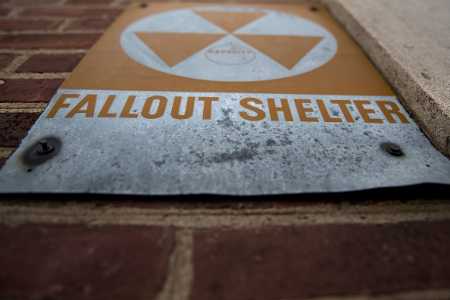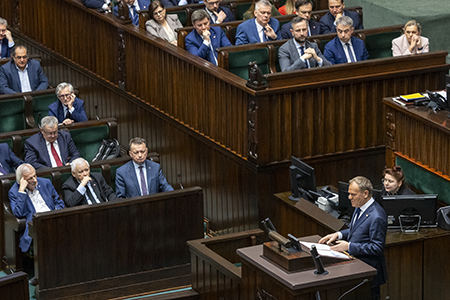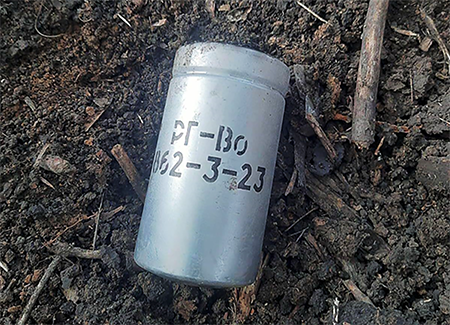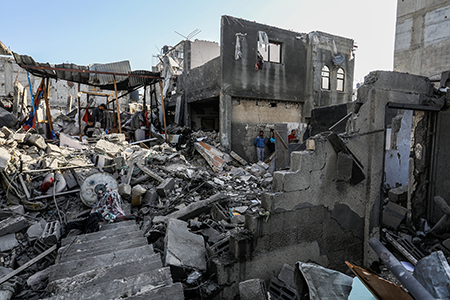During the high-stakes, February 28 Oval Office meeting when U.S. President Donald Trump tried to bully Volodymyr Zelenskyy into accepting a pro-Kremlin formula for ending the war in Ukraine, he accused the Ukrainian president of not wanting peace, and claimed he was “gambling with the lives of millions of people. You’re gambling with World War III.”
April 2025
By Daryl G. Kimball
During the high-stakes, February 28 Oval Office meeting when U.S. President Donald Trump tried to bully Volodymyr Zelenskyy into accepting a pro-Kremlin formula for ending the war in Ukraine, he accused the Ukrainian president of not wanting peace, and claimed he was “gambling with the lives of millions of people. You’re gambling with World War III.”

Although it is reassuring that Trump wants to avoid nuclear war, his comments show a failure to comprehend who and what actually drives nuclear risk: the nuclear weapons and deterrence policies of the nuclear-armed states that are used to justify their possession.
In reality, Zelenskyy is leading a non-nuclear-weapon state that is defending itself from a brutal, unprovoked invasion by Russia, a larger nuclear-armed state that has violated its 1994 pledge (shared by the United States and the United Kingdom) to respect Ukraine’s territorial integrity and refrain from the use of military force against it.
Those assurances were extended to facilitate Ukraine’s decision to relinquish the strategic nuclear weapons it inherited from the Soviet Union and to join the nuclear Nonproliferation Treaty (NPT). Today, Zelenskyy is still seeking to ensure his country’s independence and a just peace, which requires security assurances that are meaningful and durable.
Trump’s Republican allies have become so fearful of his threats of political retribution that they fail to acknowledge, much less call out, his numerous exaggerations and lies. But when it comes to war and peace and nuclear weapons, there can be no excuses.
Trump and his acolytes should acknowledge that Russia continues to illegally occupy and attack Ukrainian territory, and it is Russian President Vladimir Putin who has threatened World War III. Not long after launching the invasion of Ukraine in February 2022, Putin made veiled threats of nuclear weapons use if any state were to interfere. “No matter who tries to stand in our way ... they must know that Russia will respond immediately, and the consequences will be such as you have never seen in your entire history,” Putin said.
Seven months later, as Russian forces were in retreat in eastern Ukraine, Putin suggested that he might order the use of shorter-range nuclear weapons “if the territorial integrity of our country is threatened,” including the territory in Ukraine that Russia had illegally seized. “This is not a bluff,” he added.
Of course, the Soviet Union and the United States issued various kinds of nuclear threats and alerts during the Cold War, before the 1962 Cuban missile crisis and after. However, Russia’s recent nuclear rhetoric, which was designed to shield its assault against a non-nuclear-weapon state, is unprecedented and unacceptable in the post-Cold War era.
During his presidency, Joe Biden did not reciprocate Putin’s threats of nuclear annihilation. Instead, he reaffirmed that U.S. and NATO forces would not become engaged directly in the war, warned that the use of nuclear weapons would lead to nuclear escalation, and ensured the supply of weapons and intelligence to help Ukraine thwart aggression.
Trump may find it hard to adopt such a balanced approach. In August 2017, he engaged in a dangerous round of tit-for-tat taunts with North Korean leader Kim Jong-un, threatening North Korea with nuclear “fire and fury like the world has never seen.”
Nevertheless, rather than chastise Zelenskyy, it will be in the U.S. and global interests for Trump to stand up to Putin and say that any further nuclear threats would be “inadmissible,” as the Group of 20 countries declared in 2022.
During Trump’s discussions with Putin, he should also note that nuclear threats clearly violate the 1973 Agreement on the Prevention of Nuclear War, which commits Russia and the United States to “refrain from the threat or use of force against the other Party, against the allies of the other Party and against other countries, in circumstances which may endanger international peace and security.” Such an agreement should be extended to include China, France, and the United Kingdom.
Trump and the leaders of the world’s other eight nuclear-armed states must recognize that for non-nuclear-weapon states such as Ukraine, nuclear weapons and the deterrence strategies of the nuclear-armed states represent a grave threat to their security.
As explained in a new report issued by states-parties to the Treaty on the Prohibition of Nuclear Weapons, “the nuclear policies of all nuclear-armed states are based on implicit or explicit nuclear threats, which create an aggregated and interconnected set of global and existential risks that undermine the security of states not engaged in this practice. From this perspective, the theory of nuclear deterrence is a highly precarious gamble: one that no human being or Government should be entrusted to make.”
Trump, Putin, and the other leaders of the nuclear-armed states are gambling with the lives of every person on the planet. To improve humanity's odds of survival, we must demand that they follow through on their obligation under Article VI of the 1968 NPT to engage in good-faith negotiations to reduce the role and number of nuclear weapons and to achieve nuclear disarmament.





